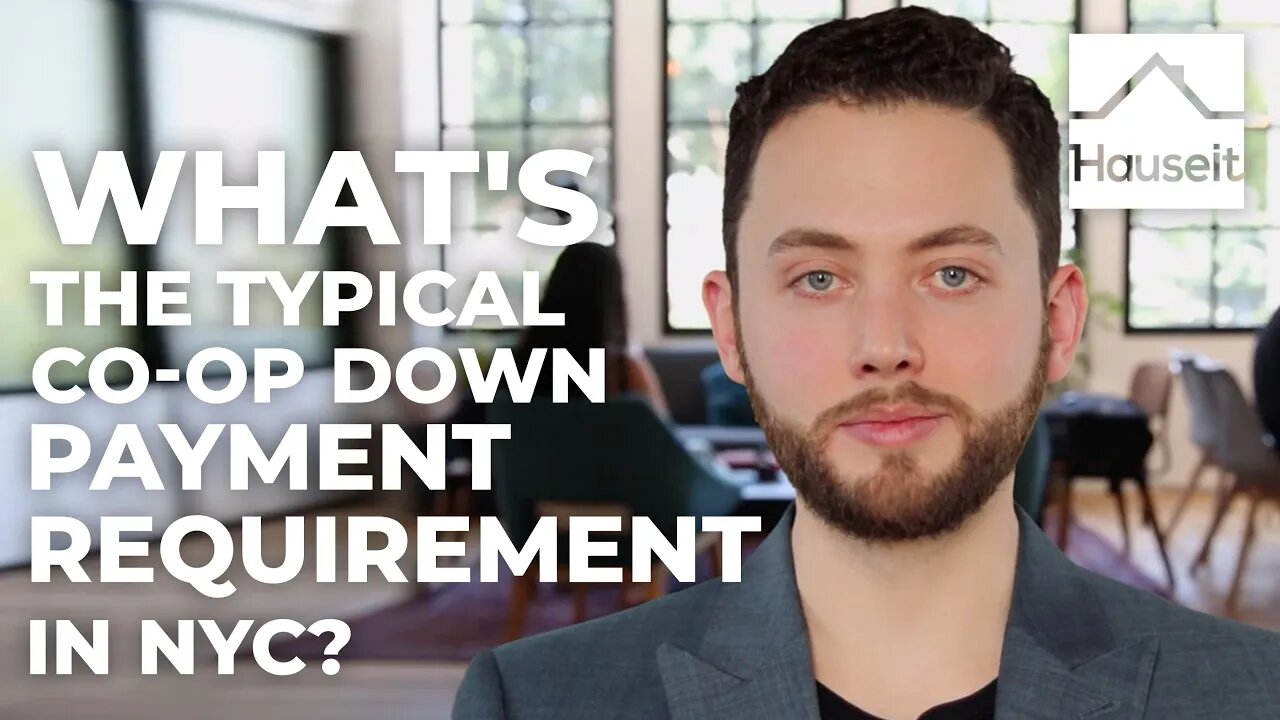Premium Only Content

What's the Typical Co-op Down Payment Requirement in NYC?
Save 2% When Buying a Co-op in NYC: https://www.hauseit.com/hauseit-buyer-closing-credit-nyc/
NYC Buyer Closing Cost Calculator: https://www.hauseit.com/closing-cost-calculator-for-buyer-nyc/
What is the typical down payment for a co-op apartment in New York City? We will demystify this topic in the following video. I'm Nick at Hauseit. We are the largest Buyer Agent Commission Rebate and For Sale by Owner company based here in New York City established in 2014.
Visit our website https://www.hauseit.com to learn about ways to save money when you're buying and selling in New York. The minimum down payment on a co-op apartment in New York City is typically 20%. In fact, the vast majority of co-op buildings will require a minimum down payment of 20%. This is much higher than for your typical house or condo in particular with a house there are usually no restrictions on a minimum amount down beyond what your lender may require. Some condominiums do require a minimum of 10% down, although these types of regulations are fairly rare.
The majority of buildings in the city that have restrictions are in fact co-op buildings and that minimum is usually 20%. When you look at the gamut of co-ops in New York, it's important to keep in mind that there are some buildings which are much stricter or much more lenient than others and in fact there's really no way to predict when looking at the outside of a co-op building what the minimum down payment requirement will be.
Most public real estate websites will not provide this information, so as a buyer the best way to get it is to have your buyer's agent reach out and inquire with the listing agent or if you happen to be unrepresented you can certainly reach out directly to the listing agent. A stricter co-op in New York City can require anywhere up to 50% to 75% down and in some cases the building might require literally an all-cash purchase.
Again there's no way to predict what a building will require you can tend to generalize sometimes if you're looking at a building on say Fifth Avenue for example on the Upper East Side a lot of these more established coops are very strict and not only will they have fairly high minimum percentage downs they'll also have other extremely stringent requirements for buyers such as hefty post-closing liquidity requirements and very low debt to income ratio requirements.
In particular, some buildings are so strict with post-closing liquidity that they can require purchasers to have up to two times of the purchase price in liquid assets and cash after closing so what this means is if you're buying a two million dollar apartment the cooperative board will not approve your application unless they see that you will have four million dollars in the bank left over after you've paid for your apartment and also after you've taken into consideration the closing costs on your purchase.
The good news about coops is that all of these buyer financial requirements actually do help the financial integrity of the building overall. If you think about it pretty much everybody in a co-op has been heavily vetted as far as the financials are concerned. So the risk of having one or multiple owners being delinquent on their common charges or rather their maintenance in the case of a co-op is fairly low. Condominiums on the other hand cannot simply reject buyers for not having amazing financials.
A condo can really only reject a buyer if the condo uses its own money to purchase the apartment at the same price that the prospective purchaser was gonna pay. Realistically though the risk of having tons of unpaid common charges in a condo in New York City is fairly low the reason being is that property prices are really high and in order to be approved by a lender even at a higher debt to income ratio that lenders underwrite to which is low 40% it still is pretty much going to be the case that most buyers are very qualified.
So you can make the argument that coops financial vetting process is completely unnecessary and excessive, but the main benefit aside from just having greater security with the building's financials is the fact that coops are just way less expensive.
A comparable condo could be 40% more money than a co-op that's exactly the same size coops also have lower buyer closing costs so there are a lot of benefits to coops despite the fact that you have to put down more money and the fact that there is a pretty rigorous co-op board application process.
Save 2% When Buying a Co-op in NYC: https://www.hauseit.com/hauseit-buyer-closing-credit-nyc/
NYC Buyer Closing Cost Calculator: https://www.hauseit.com/closing-cost-calculator-for-buyer-nyc/
.
.
Hauseit LLC, Licensed Real Estate Broker
Tel: (888) 494-8258 | https://www.hauseit.com
_
#hauseit #hauseitnyc
-
 0:59
0:59
Hot For History
3 years agoSears:$1 Down Payment Kit Homes! #shorts
22 -
 11:37
11:37
SalivateMetal
3 years agoTHIS Is What's Keeping Silver DOWN!
2 -
 12:10
12:10
TheoTRADE
3 years agoNASDAQ Down 5%: What's Leading it Lower
11 -
 7:07
7:07
The Money Guy Show
3 years agoIs a 20% Down Payment on a Home a Mistake?
1 -
 2:07:13
2:07:13
Pop Culture Crisis
3 hours agoCelebrity DOOMSDAY PREPPERS, New Tradwife Pop Star? Pedro Pascal Online SMEAR CAMPAIGN | Ep. 885
13.1K3 -
 1:35:12
1:35:12
Tucker Carlson
5 hours agoAna Kasparian: Epstein Cover-Up, Israel Strikes Gaza Church, & the Great American Political Shift
79.1K212 -
 4:08:03
4:08:03
Donut Operator
6 hours agoI'M BACK/ CRIME/ WHERE MP7
63.2K5 -
 10:35
10:35
Warren Smith - Secret Scholar Society
3 hours agoExposing the Illusion of Gary's Economics
18.7K4 -
 1:04:11
1:04:11
Crypto Power Hour
9 hours ago $0.90 earnedHow Coins Are Minted in the Blockchain World
16.1K4 -
 1:03:08
1:03:08
The Quartering
4 hours agoKarmelo Anthony Update, South Park Apologizes & Today's News!
64.3K55